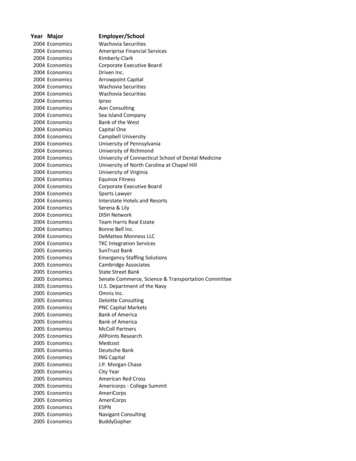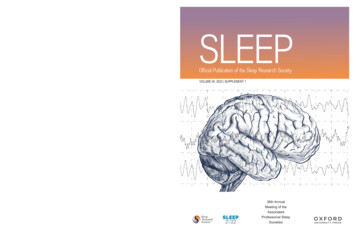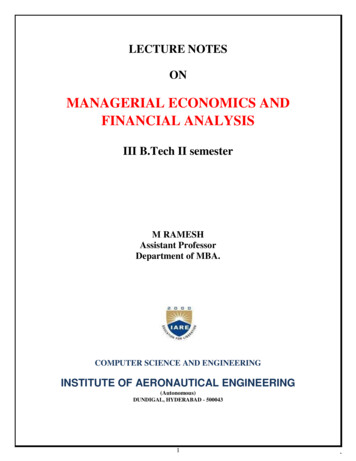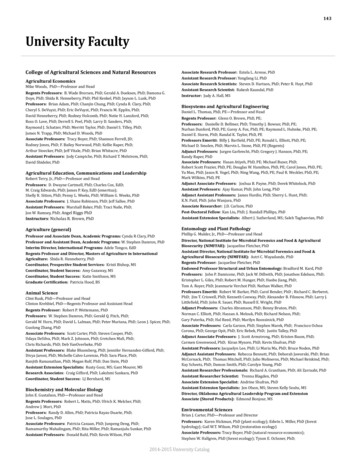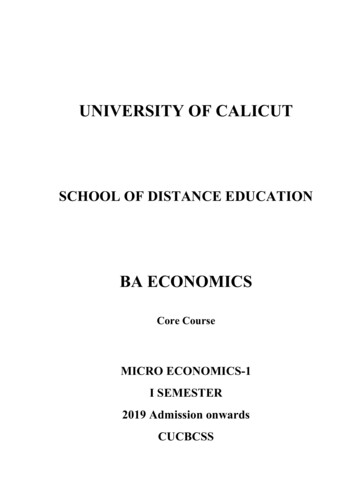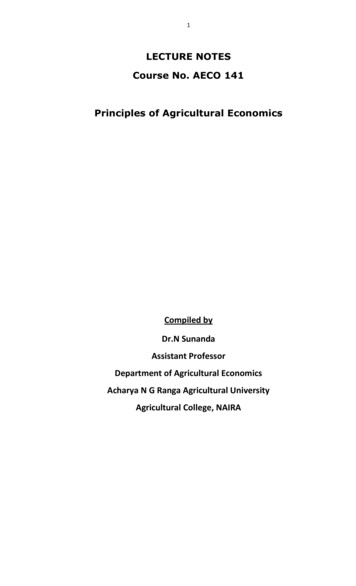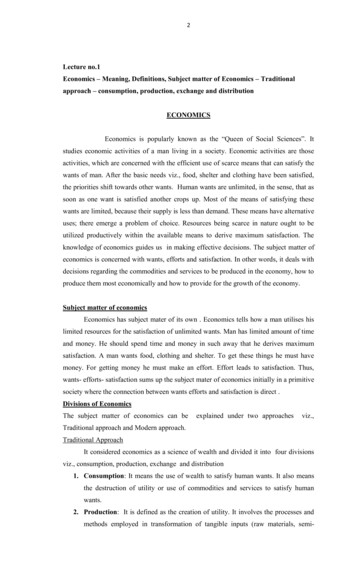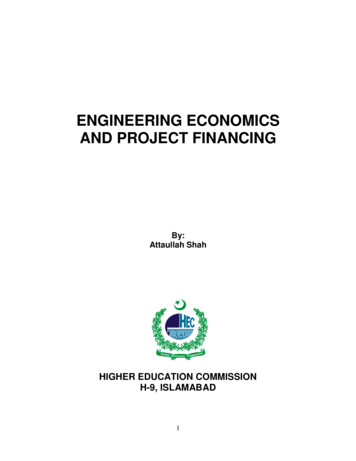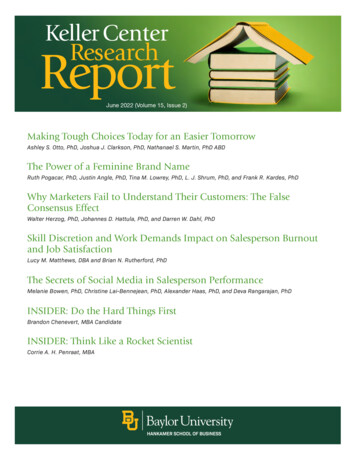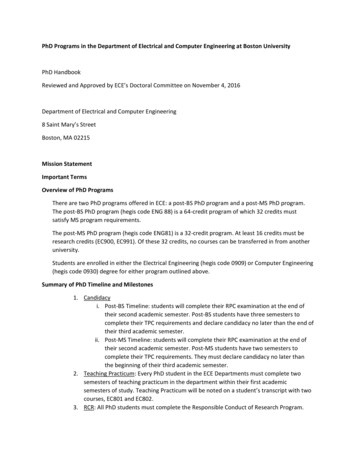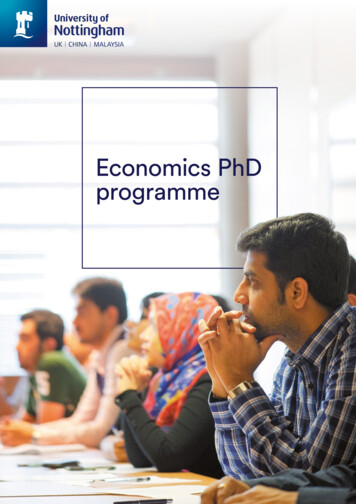
Transcription
Economics PhDprogramme
ContentsWelcomeContentsWelcome to theSchool of EconomicsWelcome 3Career and professional development 4Research interests 6PhD programme 8Applying, fees and funding 9Student experience The School of Economics is one ofEurope’s top economics departments,combining excellence in teachingwith an international reputation forrigorous and topical research of thehighest quality.10We attract some of the very best students from across the globe to ourlarge and vibrant postgraduate community. This provides a stimulatingenvironment for learning and research, without losing the friendly andinformal atmosphere for which Nottingham is renowned. We currentlyhave around 80 PhD students with approximately 40% from the UK/EUand 60% from the wider world.Our research-led approach to teaching and learning and theone-to-one expert supervision we provide will make your experienceexciting and challenging. We also offer a number of fully fundedscholarship opportunities covering tuition fees and a stipend(see page 9 for details).We are delighted that you are considering postgraduate research withthe School of Economics. Whatever your plans and ambitions, we canequip you with the skills you need to take your economics further.6th inthe UK5th inthe UKResearch ExcellenceFramework 2014Tilburg UniversityEconomics ResearchRanking 2017for economicsresearchfor researchpower“I’ve been in Nottingham for more thanfive years, and the memories are justtoo numerous to list! I love the campus,which really is a park, and I love thefriendly environment of the school.I’ve made a lot of lifelong friends here– not just among my fellow studentsbut among the staff – and these areobviously gifts that I’ll treasure forever.”Kian Ong, PhD EconomicsResearch Fellow, University of MelbourneRanked in the2top 100economicsinstitutionsworldwideRePEc/IDEAS rankings 2018nottingham.ac.uk/economics3
Career and professional developmentExcellent employmentprospectsThe School of Economics offers aleading PhD programme with anestablished academic reputation.Our students go on to a range ofexciting careers in academia andthe public and private sectors,including roles in economicsdepartments, researchinstitutions, government andorganisations around the world.Private sector 4%Internationalorganisations 10%Working in academiaWorking in industryIn recent years, our PhD graduates have securedacademic or postdoctoral positions at:Many of our PhD graduates choose a professional career pathworking as economists for government authorities and agencies,central banks, banking and financial institutions, consulting orinternational organisations. London School of Economics University of Birmingham Monash University University of Bonn University of Essex University of LeicesterGovernment 16% University of Manchester University of Manheim University of OxfordRecent examples include: Bank of England European Commission International Monetary Fund Organisation for Economic Co-operation and Development Oxford Policy Management World Bank Yale UniversityAcademia 70%“At Nottingham I cemented myunderstanding of economics anddeveloped skills in numerical generalequilibrium modelling – a method usedto evaluate sectoral and regional impactsof economic policies. I’ve used these skillsthroughout my career, even though thefocus of my research has changed fromtrade policy issues to the analysis ofclimate and energy policies.”Chart based on known destinations of full-time PhDgraduates from the School of Economics between2007 and 2016.Niven Winchester, PhD EconomicsEnvironmental Energy Economist,Massachusetts Institute of Technology4nottingham.ac.uk/economics/phd-careers5
Research interestsRenowned research centresMuch of our research is channelledthrough research centres. You canget involved in a working paper seriesor attend a range of seminars andconferences throughout the year,organised through the school andeach centre.Most academic staff are affiliated to at least one centre as internalfellows. We also have extensive networks of external fellows, drawnfrom other leading universities and the policy community aroundthe world. As a postgraduate research student, you may be directlyaffiliated to a research centre, or indirectly linked through yourresearch topic and supervisors.Centre for Research in EconomicDevelopment and International TradeGranger Centre forTime Series EconometricsDirector: Professor Oliver MorrisseyDirectors: Professor Steve Leybourneand Professor David HarveyThrough this centre, we focus on economic policies indeveloping countries, especially relating to internationaltrade, poverty, foreign aid, agriculture and commoditymarkets.Our Granger Centre has been recognised as of the leadingresearch organisations in its field. Under this umbrella,we provide and facilitate rigorous theoretical, applied andcomputational research methods.We are currently focusing on non-stationary time seriesmethods, bootstrap and other numerical methods in timeseries, and panel data methods and applications.Centre for Research on Globalisationand Economic PolicyCentre for Finance, Creditand MacroeconomicsDirector: Professor Giovanni FacchiniDirector: Professor Paul MizenSince we first established this centre 20 years ago with corefunding from the Leverhulme Trust, we have used scientific andpolicy-focused research techniques to examine trade, FDI andlabour market issues.We look at issues arising from household and corporate debtthrough the centre, alongside default on debt and against awider backdrop of credit markets and macroeconomy.We are particularly interested in the links between changesin patterns of international trade, cross-border investmentand production, international regulation and labour marketoutcomes. Our latest project explores China and theworld economy.Centre for Decision Research andExperimental EconomicsNottingham Interdisciplinary Centrefor Economic and Political ResearchDirector: Professor Chris StarmerDirectors: Dr Anja Neundorf and Professor Cecilia TestaOur behavioural and experimental economics research, andexperimental economics laboratory, is based within thiscentre, which is one of the largest of its kind in Europe. Weexamine individual and interactive decision-making thougha combination of theoretical and experimental methods.Established through a collaborative effort between the Schoolof Economics and the School of Politics and InternationalRelations, this centre brings our very distinct approachestogether. We look at political institutions and public decisionmaking, through examining representation, political behaviour,political economy and public policy, and quality of government.On the theory side, this involves investigating individual choiceunder uncertainty, cooperative, non-cooperative and evolutionarygame theory, and political economy. We apply experimentalmethods in, for example, the fields of social cooperation andsanctions, individual choice, strategic interaction, and theperformance of auctions, markets and other economic institutions.6Our interests lie in theoretical and applied public economicsand policy evaluation, with a particular focus on publiceconomic theory, political economy, pensions, retirement andconsumer finance, economics of education, health economics,and environmental policy.nottingham.ac.uk/economics/research7
PhD programmeApplying, fees and fundingThe PhD experienceHow to applyWith expert supervision and additionalresearch training, the School ofEconomics offers an excellentPhD programme.Our seminars and workshops allow you to engage with topinternational academics in various fields. Each year, masterclasses onspecific themes are held by leading researchers who visit the school.Identifying a supervisorAcademic English preparation and supportYou will be encouraged to present papers at external conferences, andfunds are available to support you with this. There is a weekly seminarseries and an annual conference where you will present your work toacademic staff and fellow students.Before you apply, consider the details of potential supervisorsto ensure we have a supervisor who shares an interest in yourproposed area of research. On application, your proposal will beforwarded to academic staff to identify a suitable supervisor.For details of potential supervisors, please redited by the British Council for the teaching of English in theUK, the University’s Centre for English Language Education provideshigh-quality preparation and support. Our presessional courses cantake your English language and academic skills to the level you need toprogress to doctoral study without retaking IELTS or equivalent. Findout more at nottingham.ac.uk/celeA PhD is the most advanced form of postgraduate study.It is awarded on the successful completion of supervisedresearch, verbal examination and final thesis.Research focusTuition feesHome from homeFor the most up to date fee information, visit nottingham.ac.uk/feesWe guarantee all new postgraduate students University-arranged,single-occupancy accommodation for one year to help make yourmove to Nottingham as simple and stress free as possible. To qualifyfor the guarantee, you must accept a place on one of our postgraduatecourses and apply for accommodation by a specified date. Find outmore about our accommodation, including the most up to date detailsof our guarantee at nottingham.ac.uk/accommodationExpert teaching and supervisionWe are a large and culturally diverse school and you will benefitfrom being taught and supervised by globally renownedresearch-active academics.Our academic staff conduct world-leading research across awide range of subjects, so we can offer expert supervision inmost areas of the discipline. You will be assigned two supervisorswho will help ensure smooth progress of your research work.For details of potential supervisors, please lls developmentDuring your first year, you will complete compulsory andrecommended taught modules. In the first semester you will take coremodules in microeconomics, macroeconomics and econometrics, inorder to acquire the necessary skills and background knowledge foryour research. In the second semester, the compulsory modules covermore advanced material. Moreover, in discussion with your supervisoryou will be recommended modules that are relevant to yourresearch interests.In subsequent years further advanced training is provided, mainlyvia intensive courses lasting one or two weeks, delivered by visitinglecturers who are world leaders in their field.You will also have the opportunity throughout your degree toundertake research and generic skills training, provided by theSchool of Economics and the Graduate School.From your second year, you will focus in more detail on your research.Training is provided for the preparation of articles for submission toacademic journals and for applying for jobs in academia.Economics research areas include: Behavioural economics Development economics Economic policy Econometrics Environmental/resource economics Experimental economics Financial economics International economics/finance/trade Macro/microeconomics Political economy Public economicsDedicated facilitiesIn addition to IT facilities provided by the University, the schooloffers full-time postgraduate research students their own workspacein dedicated rooms. You will be provided with computer, printingand photocopying facilities and will have a generous printing andphotocopying allowance.Entry requirementsApplicants typically require an ESRC-recognised masters(or international equivalent) in economics, with an average of 63%or above.EU and international applicantsAt Nottingham, our global community is made up of staff andstudents from more than 150 countries. Staff regularly travel tomeet prospective students, hosting events in China, Ghana,India, Malaysia and more. Find out more atnottingham.ac.uk/international/meetusIf you need a visa to study, the University can provide all theinformation and advice you need. Find out more atnottingham.ac.uk/go/student-visaEqual opportunities policyThe University aims to create the conditions whereby students andstaff are treated solely on the basis of their merits, abilities andpotential, regardless of gender, race, colour, nationality, ethnic ornational origin, age, socioeconomic background, disability, religious orpolitical beliefs, trade union membership, family circumstances, sexualorientation or other irrelevant distinction.For country-specific information including entry requirements, contactdetails and representatives, see nottingham.ac.uk/go/yourcountryEnglish language requirementsFor applicants whose first language is not English, we require IELTS 7.0(no less than 6.0 in any element). For more information and a list of thealternative English language requirements we accept, ing your studiesThere are many ways to fund your research studyincluding studentship opportunities. The Schoolof Economics offers a number of full-time PhDstudentships covering a maintenance stipend andUK/EU tuition fees for four years, subject tosatisfactory progress.Applications are invited for any area of economicsoffered in the school; successful students will be askedto work as teaching assistants during the course oftheir studies. For more information, tional scholarships are also available forspecific countries and regions. Find out more ow-to-apply9
The School of Economicsis based on the beautifulUniversity Park Campus– take a virtual tour atnottingham.ac.uk/virtualnottinghamStudent experienceA world-classuniversityThe University of Nottingham has campuses inthe UK, China and Malaysia, and an outstandingreputation for ground-breaking research andteaching excellence.Research at Nottingham generates discoveries,many of which have profound social, economicand cultural benefits and address major globalchallenges. Our postgraduate students makesignificant contributions to this pioneering workand can get involved in projects which have beenrated internationally excellent.Once you have completed your studies, you willbecome part of our family of 270,000 alumni inall corners of the globe. You can enjoy benefitsincluding invitations to exclusive events, lifetimeaccess to our Careers and Employability Serviceand access to a network which may proveinvaluable in your future career.Inspirational locationHome to the School of Economics, the Sir CliveGranger Building is named in honour of the 2003Nobel Prize winner who was a student and memberof staff at Nottingham for over 20 years.City lifeAs the commercial and cultural capital of the EastMidlands, Nottingham is home to several major UKemployers, including Walgreens Boots Alliance,Experian, Capital One, E.ON and the InlandRevenue. Many large blue-chip companies andprominent organisations have offices in and aroundthe city and the University has strong links withmany of them, including Rolls-Royce, based nearbyin Derby.Nottingham is an old city with a rich history, takingin the legends of Robin Hood, its role in the EnglishCivil War and the industrial revolution. You canexplore the ancient caves beneath your feet, ortake a relaxing walk through Wollaton Park and visitits imposing Elizabethan hall, which appeared asWayne Manor in the Batman film The Dark KnightRises.Nottingham’s music venues include somethingfor everyone. The legendary Rock City hosts toprock and indie acts, the Motorpoint Arena attractsnationwide music and comedy tours, while venuessuch as Rescue Rooms and the Bodega Social Clubshowcase the latest alternative acts. The RoyalConcert Hall at the Theatre Royal also hosts operaand classical concerts.As well as the University’s arts centre andmuseum, you’ll find a selection of contemporaryand traditional art galleries in the city. There aremultiplex cinemas and independent screens suchas Broadway, offering the best in arthouse andworld cinema. The city has two large theatres, aswell as smaller venues including those with regularcomedy nights. Nottingham is also a UNESCO Cityof Literature. Find out more atnottingham.ac.uk/nottinghamlifeNottingham isranked in thetop 100universitiesworldwideQS World UniversityRankings 2019Winnerof the Green Flag award for16 consecutive years“The school is brilliant. Every staff member makes sure that youlearn at every stage and that Nottingham always feels like a homefrom home. I came from India, but I never felt away from home.There are seminars almost every day, and they help you developin every aspect of economics and expand your knowledge beyondwhat you learn in your coursework.”Natasha Agarwal, PhD EconomicsConsultant, Indian Institute of Foreign TradeInspiring researchportfolio worth 799m10nottingham.ac.uk/economics11
For postgraduate research contact:Student Recruitment Enquiries Centre 44 (0)115 951 5559This publication is available inalternative formats:nottingham.ac.uk/contact 44 (0)115 951 k@UoNEconomicsnottingham.ac.uk/economicsThis brochure has been drafted in advance of the academic year to which it applies. Every effort has been made to ensure that the information contained in this brochureis accurate at the time of publishing, but changes (for example to course content) are likely to occur given the interval between publication and commencement of thecourse. It is therefore very important to check our website for any updates before you apply for the course by following nottingham.ac.uk/pgstudy. Where there is adifference between the contents of this brochure and our website, the contents of the website take precedence. University of Nottingham 2018. All rights reserved. Printed October 2018.
PhD programme Applying, fees and funding nottingham.ukac. pgst/ udy/howo-t apply- The PhD experience How to apply With expert supervision and additional research training, the School of Economics offers an excellent PhD programme. A PhD is the most advanced form of postgraduate study. It is awarded on the successful completion of supervised

